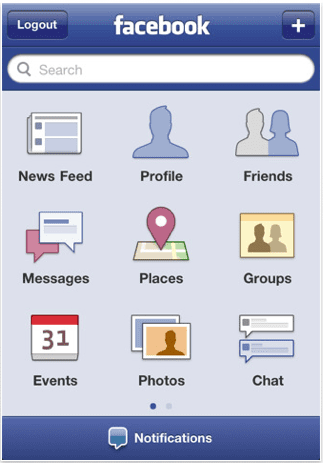One of the leitmotifs of the fictionalized biopic “The Social Network” concerns Mark Zuckerberg‘s inability/unwillingness to commercialize the burgeoning behemoth that he and his peers have conceptualized and coded. If that inability/unwillingness to imagine the commercial opportunities of Facebook were true as portrayed in the film, the CEO has certainly overcome his shyness of the market.
Recent updates to Facebook’s iPhone app allow members to mark their ‘Places’ and invite or even check-in their friends to that location. The company has also leveraged its outreach potential with customers to wrest ‘Deals’ from retailers and restaurants who want to have one Facebook user draw in other users. How does it all work for the user?

According to MacWorld.com/PCWorld.com:
Facebook Places is designed to do three main things:
– Help people share where they are in a social way.
– See which friends are nearby.
– Discover nearby places and new places through friends’ profiles.
As anyone who has followed Facebook (no pun intended) knows, security has been a contentious issue for the social-networking service. ‘Places’ encourages people to find the friends who have either placed themselves at the store/restaurant/park… in question or who are nearby and might want to join in your fun. By default, only ‘Friends’ can see one’s Places, though settings at the website can be adjusted to widen or restrict access to your coordinates.
Reviews at the iTunes site of the Facebook app are notably mixed in the way that all people seem to love/hate Facebook simultaneously: 453 give it 5 stars, 402 give it 1, and an even smattering around 100 in between. Many complain about the lack of an iPad app, though Zuckerberg quipped at the recent press confab that the iPad is ‘not mobile’ in the ways a phone is, so an iPad app is not likely in the works.
The social/food/location cognoscenti have been using Foursquare and/or Yelp for a couple of years now, and it appears that Facebook wants to absorb/take over the Foursquare and Yelp communities (many of whom are likely using Facebook as well). Though representatives of these two location-based social micro-networks were on hand to share in the announcement of developments of Facebook’s ‘Places’ feature, I can not help but think that they were there to see how the competition is going to try to pass them.
What they learned was that Facebook cut ‘Deals’ with a number of retailers to encourage folks to sign in their own ‘Place’ to draw their friends, giving both the initial Facebook customer and the folks who follow discounts at that place. Alex Madrigal at TheAtlantic.com believes such Deals will quickly tip the balance of location-based social networks Facebook’s way:
All Facebook needs is everyone to start checking in and generating data. And that’s where these new “deals” come into play. They enable businesses to give what amounts to a virtual coupon to proximate consumers. Facebook doesn’t take a cut of that transaction or anything because they don’t care about it. What they want is the data that you’re generating so they can use it to fine-tune their algorithms. And as a bonus, local businesses market Facebook’s product, Places.
… Could Foursquare and other competitors get better at optimizing results based on your connections? Sure, but they don’t have the scale of 200 million mobile users, the preexisting social network, or the experience developing social algorithms that people like.
The scale could prove critical, even though criticism has already been posted about Spaces concerning ease-of-implementation and security/privacy (Surprise!). So what if half, or more than half of those 200 million users have strong complaints about Facebook? It is what we know and it has the clout to get us what we want (or give it what it wants). Thus, any other social medium has to be so much better than Facebook that we would bother to leave it. Call it an ‘enthusiasm gap,’ which can give power to a party most people do not particularly support.
Of course, that standard works the other way as well. Given the presence and clear focus of Foursquare and Yelp, perhaps most will not feel compelled to reinvent their local social networks with Facebook. The fun of collecting badges and mayorships within Foursquare, for example, has proven a popular (non-commercial?) draw. Time will tell, and we are already looking forward to following this development over the next number of months.
Robert Strohmeyer of PCWorld.com, whose report we have already drawn on, noted the conclusion of the Facebook event that explained the (rather icky) potentiality of Places:
In summing up the announcement, Facebook VP of Product Chris Cox told a story of the future. He envisioned a time when a user will be sitting at a restaurant and their mobile device will begin to glow. The device will tell them which of their friends have eaten at this restaurant before, and what they ordered. It will share pictures of their friends visiting this place, and the good times they had there.
He envisioned a moment when a person visits San Francisco’s Ocean Beach, and their mobile device begins to glow (apparently mobile devices of the future will do a lot of glowing), and it will tell them that this was the spot where their parents shared their first kiss. It will show them pictures of that kiss, and it will share the things their friends had to say about those pictures.
So, have you ever gone anywhere and wondered if that were the place where your parents had their first kiss? And if you’re going to record the place of your own first kiss for future generations, my bet is that you’ll be waiting quite a while for the second one.
![]()
